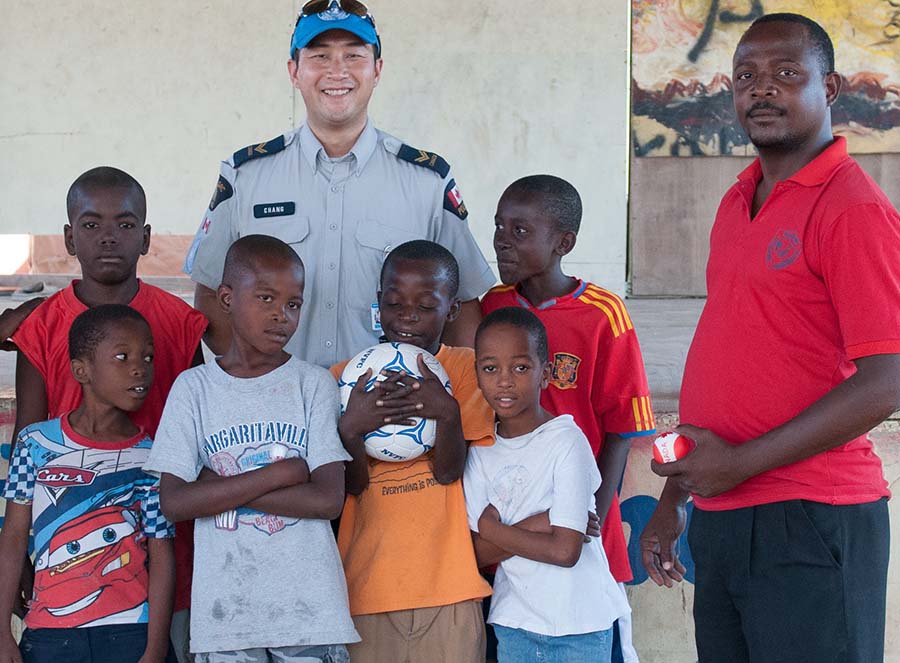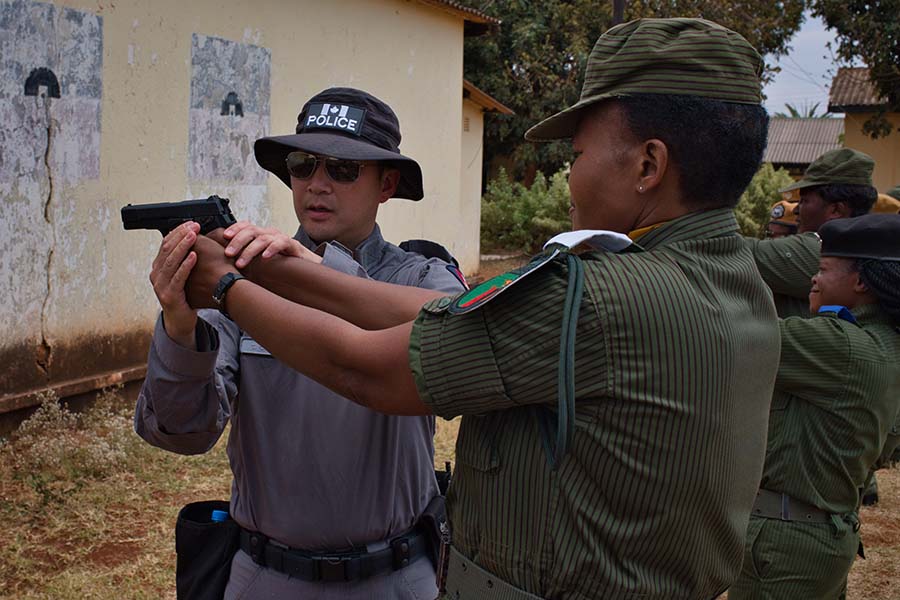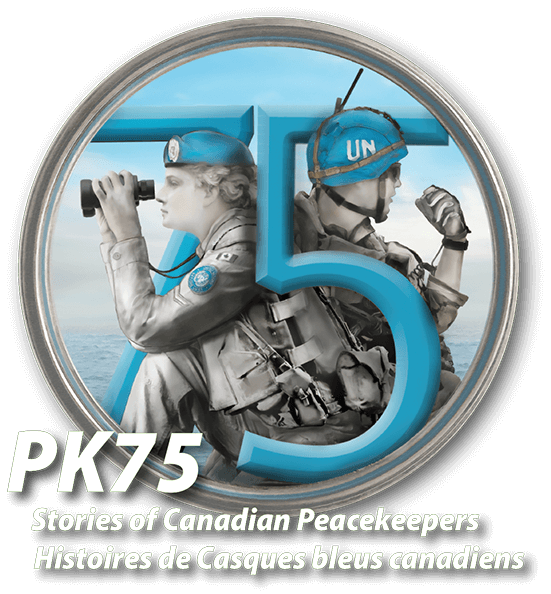

One of the biggest regrets during my time with the Infantry Reserve was not having participated on a peacekeeping mission in Bosnia. So, when I saw that the RCMP was looking for officers for a United Nations (UN) mission in Haiti, I decided that was my chance to “check that off”. After some discussion with my spouse, I submitted my name for MINUSTAH.
I arrived in Haiti in February of 2012. I was the only RCMP in my contingent, which was made up mostly of Service de police de la Ville de Montréal (SPVM), Sûreté du Québec (SQ), and Service de police de la Ville de Québec (Québec City Police). I was initially posted in Hinche, in the central plateau area. We patrolled to remote villages of the region, checking on their local police stations, and monitoring their arrest procedures, documentation, and treatment of detainees. I was also providing guidance on their investigations. I worked with UN Police officers (UNPOLs) from the USA, Argentina, Ivory Coast, China, and Sri Lanka. Sometimes it was difficult for them to comprehend each other due to language barriers. Because I speak French, English and Mandarin, during our meetings I was given an unconventional role of being a translator for other UNPOLs.
Every UNPOL coming into the mission must go through Induction Training, which includes topics such as radio communications, gender-based violence, field security, etc. Some UNPOLs also required to be assessed for mission service in which they must pass language and shooting tests. I worked as course coordinator before being appointed to be the Chief of Human Resources Development Unit. I had a team of 11 UNPOLs from 9 different countries: USA, France, Romania, Chile, The Philippines, Rwanda, Ivory Coast, Burkina Faso, Cameroon, and Niger. The multinational makeup of the team posed some unique challenges, most of them due to cultural differences, and I learned to adapt my managerial style based on those differences.
I was also selected to be part of the Selection Assistance Assessment Team (SAAT) and was responsible for administration of the Assessment for Mission Service (AMS) test for all UNPOLs entering the mission area. In November 2012, I was sent to Romania to assess Romanian police officers wishing to participate in a UN mission. This tenure turned out to be crucial in the Pre-SAAT deployments, where pre-training for the AMS is focussed on women police officers.
I’m glad that Canada is continuing its support to Pre-SAAT training. Our work directly contributes to the increase of female officers in peacekeeping operations. We often take for granted the resources that are available to us in Canada. Trips like these really reshape one’s priority and perspective. I’m grateful for this opportunity and honoured to serve.
These Pre-SAAT deployments provided unique opportunities to develop many of my organizational competencies such as developing others, flexibility, and leadership, among others. Knowing our work is directly supporting the involvement of uniformed women in the peace building, peace keeping and humanitarian work across the globe really gives me a sense of accomplishment and pride.
In my most recent Pre-SAAT deployment to Zambia, I was assigned the role of the Team Leader. This Pre-SAAT training helped the women of Zambian police to prepare for the upcoming AMS. We saw the progress firsthand. We conducted the language portion of the AMS on the first day of the training to assess the class. Had the AMS occurred without our assistance, the pass rate would have been approximately 48% for the language portion. Many more would probably be eliminated in the driving assessment. By the end of week one, we saw the pass rate for language assessment increased to 90%!
I encourage members to participate on a mission if possible. It was the highlight of my career. It has been rewarding, both on a professional and personal level. Just make sure it is for the right reason and the timing is right. One year can be long and the mission has a “magnifying” effect on everything: emotions, issues, problems at home. I was fortunate that my spouse supports me for all these deployments. My peacekeeping mission experience led me to opportunities I never knew existed, including the Pre-SAAT deployments, as well as my upcoming deployment to the International Anti Corruption Coordination Center (IACCC) in the United Kingdom.
Biography
Sergeant Tai Chang joined the RCMP out of Montréal in 1998, while working towards a degree in Mechanical Engineering at McGill University. He didn’t like the field of study he was in and was yearning for adventure. A friend told him that he applied for the RCMP and invited Tai to do the same. Growing up in Montréal, he didn’t have much exposure to the RCMP and didn’t know much about the organization. After learning that he could be posted anywhere in Canada, he was sold. Within a couple of weeks, Tai was at a recruiting office and about 15 months later, he was in the RCMP Training Depot, Troop 22, of 1998.
His first posting was to Banff, AB working in General Duty (GD) and as a Drug Abuse Resistance Education (DARE) Program instructor. In 2002, Tai was given the chance to transfer to Richmond, BC, where he worked GD in the city for a year, spent one year at the airport, and one year as Crime Prevention Victim Services coordinator. In 2005, he joined the Integrated Illegal Gaming Enforcement Team, and in 2008, he was promoted to Corporal and assigned to the E Division (BC) Human Source Unit and spent the next three years as a Witness Protection Coordinator.
In 2012, Tai was deployed to the United Nations Stabilization Mission in Haiti (MINUSTAH). He was initially posted in Hinche, central plateau area. His job was monitoring, mentoring, and patrolling with the PNH (Police National D’Haiti). About one month into the mission, he was transferred to Port Au Prince to be a course coordinator at the Induction Training Unit. He worked as course coordinator for approximately three months before he was appointed to be the Chief of Human Resources Development Unit. He was also selected to be part of the Selection Assistance Assessment Team (SAAT) and was responsible for the administration of the Assessment for Mission Service (AMS) tests for all UN police entering the mission area. In November 2012, he was sent to Romania to assess Romania police officers wishing to participate on a UN mission. This tenure turned out to be crucial in the Pre-SAAT deployments that he would do later on in his career.
Tai returned to Canada and was assigned to the Federal Serious Organized Crime. In 2014, the UN and Canada launched a pilot project in which SAAT instructors from Canada and the UN would train and prepare female police officers for the AMS. The goal of the project was to increase the number of successful female candidates at the AMS so they could be deployed to missions. This, in turn, supports United Nations Security Council Resolution 1325 to increase women’s participation in peacekeeping and post conflict reconstruction.
Tai believed his experience as a SAAT trainer would definitely be an asset to the team, and to candidates, so he put his name forward. He was among the first group of Pre SAAT trainers from Canada. In August 2014, he was sent to Rwanda and Burkina Faso to deliver the first Pre SAAT training. He participated in two other Pre SAAT deployments, one in Colombia in 2015 under a bilateral cooperation agreement, and one more in Conakry, Guinea, in 2016.
In 2014, Colombia experienced a low passing rate for their AMS. Their Permanent Mission to the UN heard about the success in Rwanda, so they approached Canada’s permanent mission to see if similar assistance can be provided to Colombia. However, at the time there was only a French version of the Pre SAAT manual but no English version, so the Canadian team was tasked to create one. Tai, along with two other Canadian police officers, went to Colombia and spent one week creating lesson plans with input from the Colombia National Police. They were later joined by three other instructors from Canada and together delivered the course. That year, Colombia experienced a much higher success rate, and they were extremely happy.
Upon his return to Canada, Tai was placed in E Division’s Federal Serious and Organized Crime (FSOC) Intelligence Unit and was later promoted to the Money Laundering Team. In 2022, Tai participated in a requalification course for Pre-SAAT instructor and later deployed to Zambia for another Pre-SAAT deployment.

January 2013: North Vancouver Football Club was gracious enough to donate a dozen soccer balls. I donated these soccer balls to children at one of the Internally Displaced Person (IDP) camps. These people have been living in the camp since the devastating earthquake of 2010.

2022 Zambia: I am helping a Zambian candidate properly grip her pistol.


